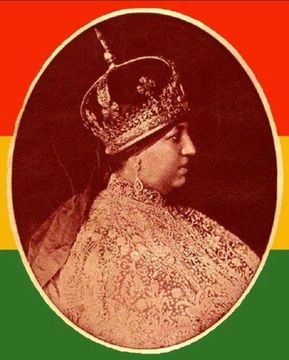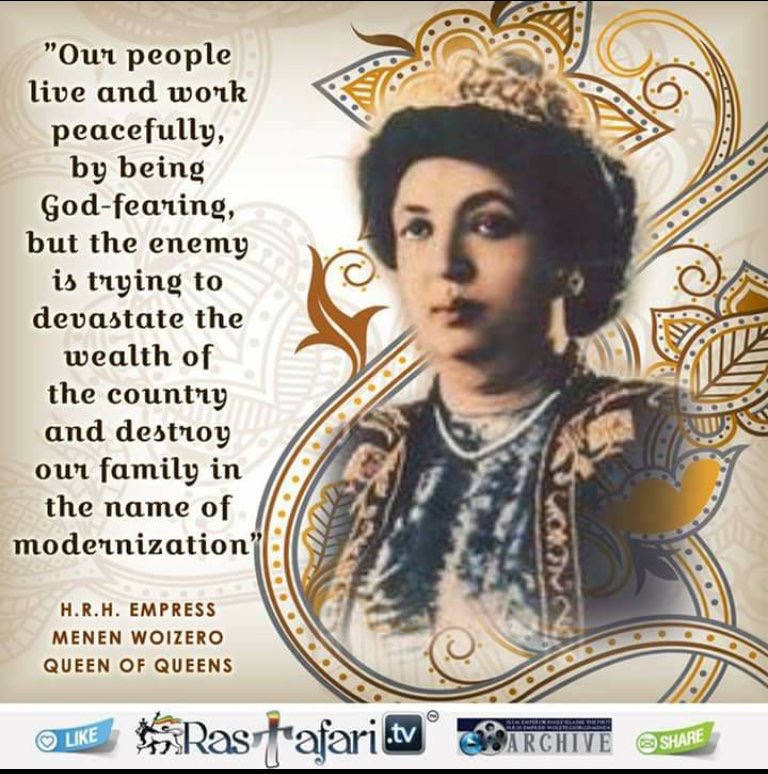Her Imperial Majesty Empress Woizero Menen Asfaw - A woman of kindness and Humanitarian Outreach4/3/2016  Her imperial Majesty Empress Woizero Menen Asfaw - A woman of kindness and Humanitarian Outreach Today, April 3, I n I reflect on the life and works of the mother of all mothers, the queen of all queens and the empress of all empresses, Queen Omega, Her Imperial Majesty Empress Woizero Menen Asfaw. She was born on April 3, 1891 and March 25, 1883 on the Ethiopian Calendar. Empress Menen was the daughter of Asfaw, Jantirar of Ambassel. The title of Jantirar traditionally belonged to the head of the family holding the mountain fortress of Ambassel, Jantirar Asfaw was one of them. She was a direct descendant of Emperor Lebna Dengel, through Emperor Gelawdewos and his daughter Princess Enkulal Gelawdewos, this genealogy was deleted from the official history of Etege Menen. Her mother was Woizero Sehin Mikael, half-sister of Lij Iyasu (Iyasu V), and daughter of Negus (King) Mikael of Wollo. Woizero Sehin's mother, Woizero Fantaye Gebru, was a direct descendant of Emperor Susenyos I in the "Seyfe Melekot" line. Her majesty is a direct descendant of the holy prophet of Islam, Mohammad. Her Majesty in Her Childhood Empress Menen's native language was Amharic and she was particularly very skillful in writing having gained various academic qualifications including home economics and spinning - an Ethiopian tradition. Woizero Menen Asfaw was given in marriage by her family, to Dejazmach Ali of Cherecha, a prominent Wollo nobleman, and bore him a daughter, Woizero Belaynesh Ali and a son, Jantirar Asfaw Ali. This marriage ended in divorce and Woizero Menen then married Dejazmach Amede Ali Aba-Deyas, another prominent nobleman of Wollo. She had two children with him, a daughter Woizero Desta Amede and a son Jantirar Gebregziabiher Amede. Unfortunately Empress Menen's second husband died suddenly. After this Woizero Menen's grandfather, Negus Mikael arranged her marriage to Ras Leul Seged Atnaf Seged, a prominent Shewan nobleman, who was considerably older than Woizero Menen, sometime in late 1909 or early 1910. Her Matrimonial Union with His Imperial Majesty Emperor Haile Selassie Her Majesty probably met Dejazmach Tafari Makonnen (later Emperor Haile Selassie) at the home of her uncle, Lij Iyasu. This may have inspired Lij Iyasu to attempt to bind Dejazmach Tafari to him more firmly through marriage ties. He therefore arranged the separation of Woizero Menen from Ras Leul Seged, and sent her to Harar to marry Dejazmach Tafari Makonnen. They were married in July 1911. Ras Leul Seged apparently did not hold a grudge against Dejazmach Tafari for this circumstance, blaming it entirely on Lij Iyasu who had ordered it. He was among the leaders who fought on the side of Dejazmach Tafari Makonnen in the Battle of Segale, and died in that battle. The Princes and Princesses (Children of His and Her Majesty)Their sacred and happy union lasted forty-seven years during which time they had six children - three daughters and three sons and many grandchildren. Listed below are details of their children: 1. Their first daughter: Princess Tenagne Worq was born in January 1913, being christened Fikirte Mariam. She married Ras Desta and then Ras Andargatchew, having six children and many grandchildren. 2. First son: Prince Asfa Wossen, heir Prince born in July 1916. He was christened Amha Selassie. He married first Princess Walata Israel and then Princess Medferiach. He had five children including Prince Yacob. 3. Second daughter: Princess Zenabe Worq, born in July 1918 and christened Hirute Selassie. She married Haile Selassie Gugsa but she passed way in March 1933 having had no children. 4. Third daughter: Princess Tsehay, born in October 1920 and christened Wolete Birhan. She married Galabiye Abebe and passed away in August 1942 without having any children. 5. Second son: Prince Makonnen, later Duke of Harar was born inOctober 1923 and christened Araya Johannes. He married Princess Sarah Gizau and passed away in May 1957, having had five sons. 6. Third son: Prince Sahile Selassie, born in February 1931. He was christened Aba Dina and was baptised at Mekane Selassie Church in Addis Ababa. Of these children only three, Princess Tenagne Warq, Crown Prince Asfa Wossen Haile Selassie and Prince Sahla Selassie survived her. The Coronation of Queen Omega and King Alpha For the first time in Ethiopian history, Empress Menen was crowned Queen of Queens, alongside Emperor Haile Selassie I, King of Kings on 2 November 1930 at St Giorgis Church in Addis Ababa. On Coronation day, H.I.M Itegue Menen was given a gold and ivory sceptre. On the entablature at the foot of the sceptre is engraved the ineffable name of God and the Pentacle King of Solomon. She was crowned Itegue Menen, Itegue being the title of an Empress. It is to be noted that H.I.M Emperor Haile Selassie I, set a new precedent for how women were viewed, by changing the course of Ethiopian history insisting that the Empress be Coronated on the same day as the Emperor and not three days later as was the custom. Both from the Solomon and Sheba lineage. "Prophecy has revealed that the marriage of the Lamb has come and His bride has made herself ready" - King Alpha and Queen Omega. Empress Menen - A Charismatic Individual With ten children, she balanced a stable family life with her benevolent King and husband, Ras Tafari, crowned Emperor Haile Selassie, she became his most trusted advisor in national and international affairs, and built up the confidence of millions of women by educating them and giving them opportunities to shine. Her garments were always royal, elegant, extremely appropriate by all international standards, and indeed, they show her royalty with the finest of silks, cottons, and other fine materials often woven with gold, silver, and velvet. Empress Menen performed perfectly in the role of Empress-consort. In her public role she combined religious piety, concern for social causes, and support for development schemes with the majesty of her Imperial status. Outwardly she was the dutiful wife, visiting schools, churches, exhibitions and model farms, attending public and state events at her husband's side or by herself. She took no public stand on political or policy issues. Behind the scenes however, she was the Emperor's most trusted advisor, quietly offering advice on a whole range of issues. She avoided the publicly political role that her predecessor as Empress-consort, Empress Taitu Bitul, had taken, which had caused deep resentment in government circles during the reign of Menelik II. She was also known for being a courageous woman. Early in Haile Selassie reign an army revolt broke out and he was taken hostage. She commandeered a tank and drove it herself through the garrison’s gate to free her husband. During the invasion of italy in Nov. 18 1928 His Imperial Majesty King of Kings Haile Sellassie I went to the north battle field, Empress Menen stayed in Addis Ababa and prepared logistics and sent to the battle field. When the enemy’s planes bombed civilians she advised the people to take care. During the bombing she travelled by car in the city to advice and encouraged the people with courage. In addition to this she has been praying waging a spiritual war against the enemy.The Holy Empress made her royal proclamation that she had faith in Almighty YAH that her husband, King David, would defeat the Italian Goliath and YAH's words would remain true: that David's throne would remain the seat of Earth's Rightful Ruler forever and ever. She was so confident in this fact, that she was willing to give up her most prized material possession: her Crown of Makeda the Queen of Sheba. She made a pledge to the Virgin Mary at the Church of the Nativity in Bethlehem, promising to give her crown to the church if Ethiopia were liberated from occupation. Following the return of Emperor Haile Selassie to Ethiopia in 1941, a replica of the crown was made for future Empresses, but the original crown that Empress Menen was crowned with at her husband's side in 1930 was sent to the Church of the Nativity in Bethlehem. Empress Menen, although often seen wearing a tiara at public events that called for it, would never again wear a full crown. Empress Menen is known to have been devoted to the traditions of the Ethiopian Orthodox Tewahedo Church, including honouring of holy feasts such as Easter and Sabbath Days. These traditions include much fasting and prayer, and strict observance of church rules and regulations. This made her a model queen for all women in Ethiopia, by remaining involved in the current affairs and progression of her country while remaining steadfast to the holy traditions of the Ethiopian Empire. As she is God fearing Empress, she always prays to YAH. She went to St. Mark church everyday and stayed up to 9 A.M. praying to YAH and received monks and nuns that came from different churches and monasteries. Every Friday She went to St. Mark Church for special praying since Friday is the day which Jesus Christ was crucified. When the Empress went from the palace to the church, she received women who lost their husbands in the war front and tried to fulfil whatever they demanded. The Empress never alienated other churches, she always read their books and liked to give attention for the interpreted views of the church. This shows how she is far sighted and had bright mind. She is a Queen to rise up and fulfil every standard as a woman, wife, a monarch, a Christian, a mother, and a benefactor to all who needed her most in her country, Empress Menen Asfaw has become the perfect role model for a woman. The Empress supported numerous charitable causes for the poor, the infirm and the handicapped. Empress Menen let Orphans to learn who lived in areas outside the capital city. Empress Menen shared problems of the poor and always visit patients in hospitals. Empress Menen took an active interest in all that went on, frequently visiting schools, looking in on classes and presiding at awards and graduation ceremonies. Empress Menen's contributions to churches, schools, hospitals are widely recognised as unparallel by any other woman in Ethiopian history. H.I.M Itegue Menen sought to serve the people instead of demanding services from them. Empress Menen believed man is mortal so that is why she always shared problems of the people and tried to solve them. Empress Menen herself had been in a deep sorrow because the passing of her beloved children. As she is strong spiritually, the Almighty YAH gave her strength. She passed each problem patiently. Even though she lost her children she never neglect the country's problem this is well known by Ethiopian people. All Ethiopian people shared her grief and sympathized her. Therefore, Ethiopian people love Empress Menen from the bottom of their heart and share the happiness and sadness of her. The Achievements of The Divine Empress
0 Comments
Leave a Reply. |
AuthorWrite something about yourself. No need to be fancy, just an overview. Archives
October 2017
Categories |


 RSS Feed
RSS Feed
